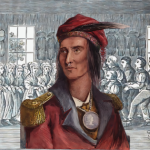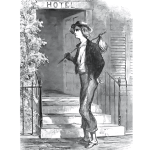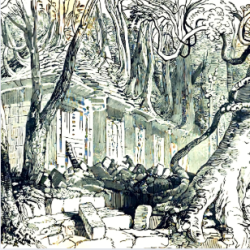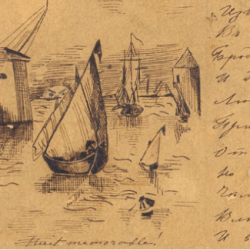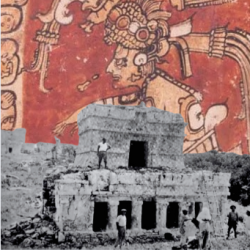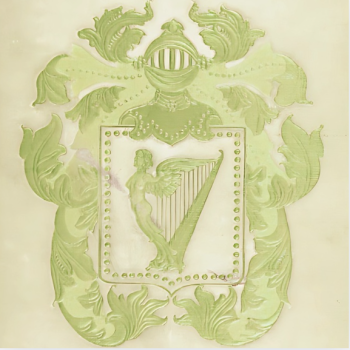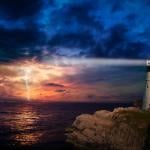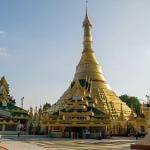Charles Johnston, Tolstoyans, And “Rambles In Russia”
In the late summer of 1888, just before leaving for India, Charles Johnston went to Russia to meet his wife Vera’s family. “I have never seen anything more beautiful and original than Moscow in all of Europe,” Johnston would state.[1] Of this brief period, we know little, except that he attended mass in the Cathedral of the Savior.[2] It is possible that Johnston met (Madame Blavatsky’s cousin,) Count Sergei Yulyevich Witté at this time. [3] Johnston would later state: “I knew Count Witté and have published several sketches of his life.”[4]
Upon his return from India in 1890, one of the first things he published was a translation of two letters of Lev Tolstoy for The Academy.[5] It is possible that he made the acquaintance of Tolstoy through W.T. Stead who visited the author of War And Peace in 1888.[6] In January 1892, Johnston’s essay, “Russia’s Legendary Lore,” was printed in The Calcutta Review.[7] This was just about the time that he and Vera went to Europe and Russia. A series of articles (“Nijni Novgorod Fair,” “Rambles In Russia,” “Russian Rambles,” “Golden Ladder Of Chin”) chronicling their experience in Russia were written for The Providence Journal.[8] Johnston’s article, “St. Petersburg In The Spring,” for the April 1894 issue of The Pall Mall Magazine gives us additional insight into the Johnston’s whereabouts at this time.[9] During this period we find Johnston writing his first articles on Russian politics, discussing the impact of trade restrictions in The Economic Journal.[10]
In 1892, Vera published her translation of Blavatsky’s The Caves And Jungles Of Hindostan (which she began in 1890.)[11] In the summer of 1894, Vera met with Alfred Joseph Faulding, a book publisher and Theosophist.[12] He agreed to publish 300 copies of Rosanchik with Truslove & Hanson, with the potential for more editions.[13] Rosanchik was published in English under the title Rosy Mite in time for Christmas 1894.[14] It was illustrated by “T. Pym” (pseudonym of Clara Creed.)[15] A review in Lucifer for Rosy Mite stated: “Such a kindly spirit of good fellowship with all that lives speaks throughout the pages of this dainty little story.”[16] It was at this time that William Quan Judge commissioned Vera to translate some of Blavatsky’s letters to her family. (These appeared in The Path from December 1894 to December 1895.)[17]
After the death of Judge in March 1896, Johnston and Vera sided with the American Theosophists. By the end of the year, they would relocate to New York at the insistence of C.A. Griscom, Jr.[18] It was this year (1896) that Johnston published a translation of Lev Tolstoy’s “Religion And Morality” in The Calcutta Review.[19] In 1898 he published a translation of Lev Tolstoy’s What Is Art?[20] That same year he published another Tolstoy translation, “The Superstitions Of Science,” for The Arena, and two articles dedicated to Tolstoy’s work and home life for the same magazine (“Count Tolstoy At Home” & “How Count Tolstoy Writes.”[21] In 1899 he published a translation of Tolstoy’s “Religion And Religions” in The Theosophical Forum.[22] That same year, Johnston’s translation of Dmitry Sergeyevich Mereshovsky’s Julian The Apostate was published.[23]
In 1898, during the Spanish-American War, Johnston offered a historical analysis of the Philippines for The American Monthly Review Of Reviews.[24] Johnston’s examination of Russian politics became more pronounced by 1900 with his two-part essay, “The Romanoffs As Reformers,” in The Metaphysical Magazine.[25] His commentaries and historical analysis began to find an audience in the secular world.[26] After President William McKinley was assassinated in 1901 by the anarchist, Leon Czolgosz, Johnston explained the historical and spiritual antecedent of Nihilism for The North American Review.[27]
After a period of hiatus, the New York Theosophical Society renewed its active work in 1903.[28] One of the first lectures in its public series was Vera’s talk, “Saintship In The Russian Church.” This lecture would prove popular outside of Theosophical ranks when given in Washington D.C. at the 1904 Convention at Metzerott Hall. “Society turned out in good numbers, the foreign legation being well-represented, the Russian embassy predominating.[29] (In 1909 Vera would lecture on the Russian Church and Russian mysticism at the Theosophically adjacent Greenacre Conferences in Eliot, Maine.)[30]
He covered the Russo-Japanese War throughout 1904-1905 for Harper’s Weekly.[31] His series of articles on the Russian Revolution of 1905 were published in the same magazine.[32] When President Theodore Roosevelt hosted a peace treaty between the Russians and the Japanese in 1905, Sergé Iulitch Witté was among the Russian delegates. Johnston wrote two articles about Sergé Iulitch Witté in preparation for the conference, “Minister Witté As Peace Commissioner” for Harper’s Weekly, and “Sergé Iulitch Witté” for The North American Review.[33] During this visit, Johnston and Witté were both guests at an illustrative dinner at Manhattan’s Metropolitan Club in honor of the Russian guests.[34] It was this summer that Johnston joined the faculty of Columbia University as a lecturer for the Extension Courses.[35] In this capacity, he gave lectures such as “The History Of Russia.”[36]
In 1910 Vera’s sister, Nadya Zhelihovskaya, married General Aleksei Alekseyevich Brusilov.[37] In 1911 the Johnstons paid them a visit in Lublin, Poland, where General Brusilov was stationed. This connection would prove an important line of communication when the Great War (1914-1918) broke out.[38] In the early days of the Great War, Johnston and Vera showed their support for Russia by helping to create the Russian War Relief Society in 1915.[39] More directly, Johnston worked for the United States military in the Department of Military Intelligence.[40] The exact nature of his involvement is unclear, but it would seem that his role was something of a linguistic and cultural translator. He wrote at least sixteen articles about Russia (and the rise of the Soviets) during the war for The North American Review.[41] He also wrote at least nine articles along similar lines for The New York Times and Current History.[42] By 1916, Johnston was living on Clinton Avenue in Bergenfield, New Jersey.[43] Perhaps it was to be closer to Camp Merritt during the war.[44] At this time Johnston and Vera were also instructors at the Russian Seminary in Tenafly, New Jersey.[45] It would seem that Johnston was back in New York by the autumn of 1917 as he delivered a course of lectures about Russia at the Eastern District High School in Brooklyn.[46]
The following is Johnston’s encounter with a colony of Tolstoyans in 1893:
RAMBLES IN RUSSIA.
I came across a farmstead of woe-begone enthusiasts the other day in an out of the way corner of the country not far from Moscow.[47] The air was full of that bright yellow cold that only Central Russia can furnish, and the fields were wrapped in a crisp and crackling mantle of pure white snow. The pale birches spread their lace-like fingers in the air, and the great silver firs were the only dark green break in the everlasting whiteness. These poor, woe-begone enthusiasts, three young women and four men, shared between them a log house, partitioned in the middle, one end being given up to the men; the other being the kitchen, dining room, and sleeping room for the ladies. They had in their eyes the light of fanaticism, or reflection of heaven, if you will, that one sees in the eyes of young recruits in the Salvation Army; and young Soudanese of the Mahdi. For these pinched and wide-eyed farmers are also in their way soldiers and apostles; the soldiers of the new dawn of humanity preached by the famous Count Lev Nikolayevich Tolstoy.
Seeing that I stopped before their homestead they asked me to come in, and hospitably supplied me with a steaming glass of tea. Then, as the faint warmth of their half sunk fire melted the icicles from my moustache and a general sense of well-being began to accompany the tea through my veins, they began to lament and bemoan their hard fate. A few months ago, they said, they had come there full of a glow of hope to put into practice the golden rules of Tolstoy.
Tolstoy’s practical ethics came down to this: “Evil exists all around us; everything is falsehood, lies and deceit. Our social system is full of rottenness. Let us cut ourselves adrift from it; let us return to the soil, and at least, by pure and simple life, generate no more falsehoods, lies and deceits. let us not resist evil, but submit passively rather than create new evil by our resistance.” The practical outcome of all this is seen in my Tolstoyan colony. A group of young men and young women, well-born, and nourished in comfort and ease, inspired with enthusiasm for Tolstoy’s ideals, have decided to return to the soil; to enter into primary relations with the earth; to cut themselves adrift from the rotten social system that bred them. The result is—a group of melancholy, woe-be-gone faces, that look at me, hungry and cold, as I warm myself beside their fire, and sup a pleasant glass of amber-steaming tea. The simple fact is, that these theories of life are, in practical life, no good at all. They cannot dig; cannot plant—at least, when they do, nothing grows up. They do not understand the signs of the sky and lose their crops by reaping too late or too soon. In this they are types and symbols of Count Tolstoy, their apostle.
The Tolstoyan farm doesn’t work. Nor is this to be wondered at when you consider how the farm hands are recruited. In Russia, as in many other lands, the output of the universities, the young men and mildens full of scientific and historical information, but possessing no practical knowledge of any handicraft or trade, is far greater than the professional needs of the country can find any place for.[48] The surplus, the unsuccessful or unlucky students, find themselves thrown on their own resources; the doors of professional life are closed to them, or tremendously overcrowded. They cannot dig; to beg they are ashamed. Then they begin to curse the social system which finds no place for them, and then they take to hatching conspiracies. In the latter course they are wrong, for no betterment ever comes from the dynamite argument; but in their protest against the social system they are quite right. “The social system, instead or hauling them off to the academies and colleges, should have left them at home, on the farms and in the workshops of their fathers and grand-fathers, to grow up honest sons of the people, honest toilers with their hands, and not mere incompetent dilettantes in a culture which takes generations of study to comprehend. The authorities in Russia, have come to perceive the mistake that gave birth to the poor starveling students, and a move is being made to close the doors of the universities to them and open wider the technical schools, where trades and handicrafts are practically taught.
One of the Tolstoyans told me a good story, which was none the worse for being against himself. It seems that the colony had adopted a small orphan boy, of robust health, but doubtful temper. This boy soon grasped the fact that his adopters held the doctrine of non-resistance to evil, and at once rose to the occasion. His trousers were torn and mended, till they would bear mending no longer. So one morning, before the colony of his adopters was astir, he seized the pair of trousers nearest his own size, and quietly put them on. They happened to belong to the friend of the narrator. He awoke, and missing them, instituted a search. The orphan Miohka (Mike) by name, at once admitted that he had taken them, and dared my friend to lake them back. “You say ‘resist not evil,’” said Mike, speaking like another Tolstoy; well, I have stolen your trousers, stealing is evil; therefore you are bound not to resist it, and if you do, I warn you I’ll kick!” Here I draw the curtain over the woes of the Tolstoyan colony.
Whenever it has been my lot to pass through Poland, as I did soon after visiting the Tolstoyan colony, I have been struck with a difference in everything, as compared with things Russian; a difference which, though strong and vivid, is very difficult to describe. In the first place, the people are different; the Polish race are a gay, graceful, pleasure-loving people, very unlike the pensive, melancholy peasantry of Great Russia. Then, in religion they are Roman Catholic, and that faith always seems to give its followers a feeling of light carelessness and responsibility, as if they felt all the time that the Church was doing their thinking for them, and that they had shifted the burden of their soul’s salvation to other shoulders, and might eat, drink, and be merry, taking no thought for the morrow.
In one of the villages of Poland a cavalry regiment happened not long ago to be quartered, several of the officers of which I knew, so that I had an unusually good opportunity of studying the manners and customs of the Russian army at close quarters. By the way, in speaking of the Russian army, we must remember that, in these later days, the army is no longer, as it used to be, something apart separate from the national life. Since universal military service has become the rule, the army is the nation; and the discipline of the army becomes a great training school for the nation itself.
To return to my cavalry camp in Poland, the soldiers are, for the most part, pure Russians of the muscovite type, ruddy young peasants, overflowing with health and good humor, and yet with a peculiar gentleness and melancholy that are deeply ingrained in the Russian character. They are, in their dark-colored uniforms and high boots, types of the military neatness and accuracy; but what most distinguishes them, say, the Russian army or the French is their round cloth caps with a glazed crescent-shaped peak, coming down over the nose: this peak has a curious effect, as I have noticed, of so admirably shading the brows of Russian soldiers that there is always a clear line of demarcation between the sunburnt, browned and air-tanned lower part of the face and the much paler upper part; the two shades, white and brown, meeting, but not mixing, on the bridge of the nose. Then come the horses, for this is a cavalry camp, and beautifully groomed and tended they are, though, to my eye, smaller and less gracefully proportioned than well-bred English or Australian horses. As to their harness, military saddles, jangling bits and polished bridles, all seems in admirable order, as far as a civilian can judge.
The Russian officers here say that there is nothing so utterly and absolutely dull in human experience as their daily life in an out-of-the-way station like this in Poland. They know only a few of the neighboring landowners and magnates, and these few are all so far off that the effort necessary to reach them, through the hot dust of summer, or deep mud of autumn, is too dreadful to contemplate; and then the insurrections in Poland are too recent for any warm sympathy to have sprung up between the conquered Poles and the Russian officers who conquered them. The officers would hunt it there was anything to hunt, but just now there is nothing, not even a hare. When the frosts come on, the snow is on the ground and the hungry wolves come out of the Lithuanian forest, things will perhaps be more lively, and the hours will pass a little quicker. But just now life is one long bore; the daily maneuvers and exercises, carried out with strict accuracy and painstaking fidelity, leave them too little energy for any serious pursuits, and of light and frivolous occupation there is not a trace.[49]
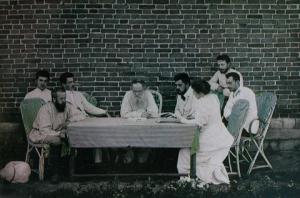
“Tolstoy organising famine relief in Samara, 1891.” (Source: Wiki)
SOURCES:
[1] Zhelikhovskaya, Vera Petrovna. V. P. Zhelikhovskaya Letters (1878-1896) Bakhmut Roerich Society, n.d.
[2] Johnston, Charles. “The Primaeval Language.” The Contemporary Review. Vol. LXXVI. (July-December 1899): 694-703.
[3] Witté at this time was Inspector in the Society of Navigation and Commerce, which owned the Southwestern Railroad of Russia (connecting Warsaw and Kiev with the port of Odessa.) He warned Tsar Alexander III of the dangerous conditions under which the trains operated when he accompanied the Emperor to Yalta earlier that summer. [Johnston, Charles. “Serge Iulitch Witté.” The North American Review. Vol. CVIII, No. 586. (September 1905): 435- 447.]
[4] E.T.H. “On The Screen Of Time.” The Theosophical Quarterly. Vol. XXVII, No. 3. (January 1930): 286-297.
[5] Johnston, Charles. “Two Of Lyef Tolstoi’s Letters.” The Academy. No. 960. (September 27, 1890): 273.
[6] Stead, William T. The Truth About Russia. Cassell & Company, Limited. London, England. (1888): 420-426.
[7] Johnston, Charles. “Russia’s Legendary Lore.” The Calcutta Review. Vol. XCIV, No. 187 (January 1892): 1-25.
[8] Johnston, Charles. “Nijni Novgorod Fair.” The Providence Journal. (Providence, Rhode Island) October 30, 1892; Johnston, Charles. “Rambles In Russia.” The Providence Journal. (Providence, Rhode Island) February 19, 1893; Johnston, Charles. “Russian Rambles.” The Providence Journal. (Providence, Rhode Island) April 16, 1893; Johnston, Charles. “Golden Ladder Of Chin.” The Providence Journal. (Providence, Rhode Island) October 15, 1893.
[9] Johnston, Charles. “St. Petersburg In The Spring.” The Pall Mall Magazine. Vol. II, No. 6 (April 1894): 941-950.
[10] Johnston, Charles. “State Advances On Corn In Russia.” The Economic Journal. Vol. IV, No. 13 (March 1894): 133-136.
[11] Johnston, V. V. “Letters Of Vera Johnston,” [j.] December 16, 1890 [g.] December 28, 1890, London, England, entry]; Blavatsky, Helena Petrovna; Johnston, Vera (tr.) From The Caves And Jungles Of Hindostan. Theosophical Publishing society. London England (1892.)
[12] Alfred Joseph Faulding. [Ancestry.com. England & Wales, Civil Registration Death Index, 1916-2007 [database on-line]. Provo, UT, USA: Ancestry.com Operations Inc., 2007. Original data: General Register Office. England and Wales Civil Registration Indexes. London, England: General Register Office. General Register Office; United Kingdom; Volume: 1b; Page: 663.]
[13] Vera Petrovna would receive nothing for the first thousand, and 10% for the second. “The conditions are good,” Vera states, “as the company is businesslike, and assures us that it will sell at least 2,500 copies.” The publishers wanted to sell Rosanchik for 2 shillings and 6 pence. To reduce the cost of printing, the size of the book was reduced, and the illustrations were colorless. Truslove & Hanson also decided that it would be unwise to mention that it was a translation from Russian, and to let readers “think it [was originally] written in English.” Johnston, V. V. “Letters of Vera Johnston,” [j.] August 15, 1894, [g.] [August 27, 1894. 17 Avenue Road, London, England, entry]; [g.] January 23, 1891, London, England, entry.]
[14] Jelihovsky, Vera Petrovna. Rosy Mite or The Witch’s Spell. Truslove And Hanson. London, England. (1894.)
[15] Gonzalez, Eugenia. “’I Sometimes Think She Is A Spy On All My Actions’: Dolls, Girls, And Disciplinary Surveillance In The Nineteenth-Century Doll Tale.” Children’s Literature. Vol. XXXIX. (2011): 33-57.
[16] H.T.E. “Review: Rosy Mite: Or The Witch’s Spell.” Lucifer. Vol. XV, No. 87. (November 15, 1894): 252.
[17] Johnston, Vera (trans.) “Letters Of H.P. Blavatsky Pt. I.” The Path Vol. IX, No. 9 (December 1894): 265-270; Johnston, Vera (trans.) “Letters Of H.P. Blavatsky Pt. II.” The Path Vol. IX, No. 10 (January 1895): 298-302; Johnston, Vera (trans.) “Letters Of H.P. Blavatsky Pt. III.” The Path Vol. IX, No. 11 (February 1895): 379-385; Johnston, Vera (trans.) “Letters Of H.P. Blavatsky Pt. IV.” The Path Vol. IX, No. 12 (March 1895): 411-415; Johnston, Vera (trans.) “Letters Of H.P. Blavatsky Pt. V.” The Path Vol. X, No. 1 (April 1895): 6-8; Johnston, Vera (trans.) “Letters Of H.P. Blavatsky Pt. VI.” The Path Vol. X, No. 2 (May 1895): 33-37; Johnston, Vera (trans.) “Letters Of H.P. Blavatsky Pt. VII.” The Path Vol. X, No. 3 (June 1895): 73-78; Johnston, Vera (trans.) “Letters Of H.P. Blavatsky Pt. VIII.” The Path Vol. X, No. 4 (July 1895): 105-108; Johnston, Vera (trans.) “Letters Of H.P. Blavatsky Pt. IX.” The Path Vol. X, No. 5 (August 1895): 139-142; Johnston, Vera (trans.) “Letters Of H.P. Blavatsky Pt. X.” The Path Vol. X, No. 6 (September 1895): 169-174; Johnston, Vera (trans.) “Letters Of H.P. Blavatsky Pt. XI.” The Path Vol. X, No. 7 (October 1895): 203-206; Johnston, Vera (trans.) “Letters Of H.P. Blavatsky Pt. XI.” The Path Vol. X, No. 8 (November 1895): 235-240; Johnston, Vera (trans.) “Letters Of H.P. Blavatsky Pt. XII.” The Path Vol. X, No. 9 (December 1895): 267-270. Ernest Temple Hargrove was tasked with correcting the resulting English, “and to be responsible generally for their preparation for the press.” see Hargrove, Ernest Temple. “Letters From W.Q. Judge IV.” The Theosophical Quarterly, Vol. XXIX, No. 3. (January 1932): 238-247.
[18] Johnston writes: “Clement Griscom did much to facilitate my coming, in that kind and gentle way which was so deeply characteristic of him; and from that time forward, his friendship was among my most precious possessions.” [Johnston, Charles. “Reminiscences.” The Theosophical Quarterly. Vol. XVI, No. 4 (April 1919): 323-326.
[19] Johnston, Charles. “Religion And Morality By Count Leo Tolstoi.” The Calcutta Review. Vol. CIII, No. 206 (October 1896): 306-315.
[20] Tolstoy, Lev; (tr.) Johnston, Charles. What Is Art? Henry Altemus. Philadelphia, Pennsylvania. (1898.)
[21] Johnston, Charles. “The Superstitions Of Science.” The Arena. Vol. XX, No. 1 (July 1898): 52-60; Johnston, Charles. “Count Tolstoy At Home.” The Arena. Vol. XX, No. 4 (October 1898): 480-490; Johnston, Charles. “How Count Tolstoy Writes.” The Arena. Vol. XXI, No. 3 (March 1899): 269-272.
[22] Johnston writes at the conclusion: “It would be difficult to overestimate the value of this essay. Without knowing it, Tolstoi has reached the heart of the Eastern doctrine. His first religion is that of the physical body; his second, that of the psychic; his third, that of the causal self, ‘the Power which sends us into the world.’ To establish a true relation with the causal self, and thereby with the eternal source of the universe, is undoubtedly the end of all true religion and morality. It is a testimony at once to the truth of the Eastern teaching, and to his own inspiration, that Tolstoi should have divined this threefold division of man, under the brooding power of the fourth, the Eternal.” [Johnston, Charles. “Religion And Religions: Pt. I.” The Theosophical Forum. Vol. V, No. 6 (October 1899): 110-116; Johnston, Charles. “Religion And Religions: Pt. II.” The Theosophical Forum. Vol. V, No. 7 (November 1899): 125-131; Johnston, Charles. “Religion And Religions: Pt. III.” The Theosophical Forum. Vol. V, No. 8 (December 1899): 147-151.]
[23] Mereshovski, Dmitry Sergeyevich; (tr.) Johnston, Charles. Julian The Apostate. Henry Altemus. Philadelphia, Pennsylvania. (1899.)
[24] Johnston, Charles. “The Philippines In History.” The American Monthly Review Of Reviews. Vol. XVII, No. 6 (June 1898): 698-705.
[25] Johnston, Charles. “The Romanoffs As Reformers. Pt. I” The Metaphysical Magazine. Vol. XIII, No. 2 (August 1900): 75-81; Johnston, Charles. “The Romanoffs As Reformers. Pt. II” The Metaphysical Magazine. Vol. XIII, No. 3 (September 1900): 165-171.
[26]Some articles from this period in The North American Review include: Johnston, Charles. “Struggle For Reform In China.” The North American Review. Vol. CLXXI, No. 524 (July 1900): 13-25; Johnston, Charles. “Nihilism And Anarchy.” The North American Review. Vol. CLXXI, No. 526 (September 1900): 302-313; Johnston, Charles. “Porfirio Diaz.” The North American Review. Vol. CLXXVI, No. 554 (January 1903): 115-124; Johnston, Charles. “Macedonia’s Struggle For Liberty.” The North American Review. Vol. CLXXVI, No. 555 (February 1903): 223-235; Johnston, Charles. “Present Tendencies In Russian Policy.” The North American Review. Vol. CLXXVI, No. 555 (May 1903): 765-777; Johnston, Charles. “The Servian Tragedy.” The North American Review. Vol. CLXXVII, No. 560 (July 1903): 12-21; Johnston, Charles. “Mr. Wyndham’s Land Act And The Future Of Ireland.” The North American Review. Vol. CLXXVII, No. 563 (October 1903): 552-563.
[27] Johnston stated: “It has become very evident that these masses of Italian and Slavonic immigrants sent forth from their motherlands by the grinding deprivations of their lives have brought with them not only their languages and mental idiosyncrasies, but the whole psychic atmosphere of their homes; so that we have districts of Poland and Bohemia and Italy with all their bitter memories caught up, as it were, and carried bodily through the air to this country. The impress of oppression has worn too deep to be easily cast off, and the difficulty of establishing themselves in a new country is often construed by them as a continuation of the old bad forces which drove them forth from their homes. Therefore, we see that the anarchists of this country […] in no sense a product of American conditions, but rather a growth transplanted from the Old World, where they were engendered not through any diabolic malice of their own, but as the result of dreadfully burdensome conditions of life […] It is a startling reminder to us of the endless complexity of life in the United States—this presence among us of numberless miniatures of older European lands, clinging to their own tongues and customs, and still haunted by wraiths and vampires that drove them forth from their homes.” [Johnston, Charles. “The Anarchists And The President.” The North American Review. Vol. CLXXIII, No. 539 (October 1901): 437-444.]
[28] “T.S. Activities.” The Theosophical Quarterly. Vol. I, No. 3 (January 1904): 94-99; . “T.S. Activities.” The Theosophical Quarterly. Vol. I, No. 4 (April 1904): 130-132.
[29] “Mrs. Johnston’s Lecture On Russian Church” The Washington Times. (Washington, District of Columbia) May 8, 1904.
[30] “Events Of Eliot.” The Portsmouth Herald. (Portsmouth, New Hampshire) August 6, 1909.
[31] Johnston, Charles. “The Approaching Doom Of Port Arthur.” Harper’s Weekly. Vol. XLVIII, No. 2480 (July 2, 1904): 1013-1016; Johnston, Charles. “Russia’s Commander In The East.” Harper’s Weekly. Vol. XLVIII, No. 2483 (July 23, 1904): 1143; Johnston, Charles. “Count Tolstoi On The War.” Harper’s Weekly. Vol. XLVIII, No. 2486 (April 13, 1904): 1244-1245; Johnston, Charles. “From Liao-Yang To Mukden.” Harper’s Weekly. Vol. XLVIII, No. 2492 (September 24, 1904): 1458-1461; Johnston, Charles. “The Commanders At Port Arthur.” Harper’s Weekly. Vol. XLVIII, No. 2493 (October 1, 1904): 1496-1498; Johnston, Charles. “Czar Nicholas II.” Harper’s Weekly. Vol. XLVIII, No. 2498 (November 5, 1904): 1706; Johnston, Charles.
[32] “Russia’s New Minister Of Interior.” Harper’s Weekly. Vol. XLVIII, No. 2504 (December 17, 1904): 1953-1954; Johnston, Charles. “Russia’s Struggle For Liberty.” Harper’s Weekly. Vol. XLIX, No. 2512 (February 11, 1905): 206-207; Johnston, Charles. “Minister Witté As Peace Commissioner.” Harper’s Weekly. Vol. XLIX, No. 2537 (August 5, 1905): 1120; Johnston, Charles. “Tolstoi And The Russian Parliament.” Harper’s Weekly. Vol. XLIX, No. 2543 (September 16, 1905): 1340-1341; Johnston, Charles. “The Dawn Of Russian Liberty.” Harper’s Weekly. Vol. XLIX, No. 2551 (November 11, 1905): 1630-1631; Johnston, Charles. “The Leaders Of The Russian People.” Harper’s Weekly. Vol. XLIX, No. 2540 (August 26, 1905): 1226; Johnston, Charles. “Leaders Of Russian Liberty.” Harper’s Weekly. Vol. L, No. 2562 (January 27, 1906): 114-116.
[33] Johnston, Charles. “Minister Witté As Peace Commissioner.” Harper’s Weekly. Vol. XLIX, No. 2537 (August 5, 1905): 1120; Johnston, Charles. “Serge Iulitch Witte.” The North American Review. Vol. CVIII, No. 586. (September 1905): 435- 447.
[34] “Toast To Roosevelt Proposed By Witte.” The New York Times. (New York, New York) September 8, 1905.
[35] To facilitate the work of instruction for students further away from the campus at Morningside Heights, Columbia’s Administrative Board authorized the use of local neighborhood centers for remote learning. Johnston would deliver many of his lectures at the new Brooklyn Institute or Williamsburg’s Henry McCaddin Memorial on Berry Street. [“Extension Teaching.” Columbia University Catalogue (1906-1907): 379-382; Columbia University. “Announcement Of Extension Teaching” Columbia University Bulletin Of Information. No. 23 (1907-1908): 12, 22; “Brooklyn Gets Two New Lecture Centres.” The Brooklyn Times Union (Brooklyn, New York) December 28, 1907; “Brooklyn Institute Notes” The Brooklyn Citizen (Brooklyn, New York) February 1, 1908.]
[36] Columbia University. “Announcement Of Extension Teaching” Columbia University Bulletin Of Information. No. 23 (1907-1908): 75-76; “Brooklyn Gets Two New Lecture Centres.” The Brooklyn Times Union (Brooklyn, New York) December 28, 1907; “Brooklyn Institute Notes” The Brooklyn Citizen (Brooklyn, New York) February 1, 1908; “Types Of Irish Character” The Brooklyn Daily Eagle (Brooklyn, New York) February 15, 1908; “Talked About Brian Boru” The Brooklyn Daily Eagle (Brooklyn, New York) February 22, 1908; “Owen Roe O’Neill” The Brooklyn Daily Eagle (Brooklyn, New York) March 1, 1908; “Edmund Burke, Statesman” The Brooklyn Daily Eagle (Brooklyn, New York) March 7, 1908.
[37] Cockfield, Jamie H. Russia’s Iron General: The Life of Aleksei A. Brusilov, 1853–1926. Lexington Books. Lanham, Maryland. (2019): 21-25.
[38] Johnston writes: “At Lublin, by virtue of an international kinship, I had the good fortune to be General Brusiloff’s guest in late-summer of 1911. If I were to seek for a single phrase, to sum up the impression made by his personality, it would be, distinction—personal distinction in a high degree. But one may associate the idea of distinction with a certain kind of weakness of over refinement. Another element of his fine hospitality was the way in which he avowed one to share his deepest interests. Very like General Foch in certain qualities, he is like him also in this, that he is deeply religious—in the highest sense a Christian mystic. And speaking of things mystical he talked one day of a book he had been reading the story of a modern Antichrist—a man supremely endowed with intellectual power and exercising a fascination over masses of men, who, in the name of material well-being of the earthly paradise was seducing men’s souls from every vestige of spiritual faith. ‘I believe,’ he said, ‘that the author’s idea is a true one. There is an Antichrist, and we shall have to fight him!’ One should hold this steadily in view I think as expressing his deepest conviction concerning the present war, and his own part in it. He holds that he is facing, and thrusting back, the organized forces of evil.” [Johnston, Charles. “Brusiloff: Man And General.” The Atlantic Monthly. Vol. CXVIII, No. 3. (September 1916): 409-416.] Brusilov writes in his memoir: “At the end of the summer of 1911, my wife’s older sister, Vera Vladimirovna, came to us from America with her husband Charles Johnston. I knew her for a long time, but I saw her American husband for the first time. Publicist, writer, theosophist, occultist, translator of ancient manuscripts and books from Sanskrit, Hindu, Bengali, he interested me very much, and we spent several interesting evenings with him. They stayed with us for a short time.” [Brusilov, A.A. My Memories. State Publishing House, Military Department. Moscow, Russia. (1929): 45.] During the Great War, Johnston would write four articles dedicated to General Brusilov; two were in The New York Times and the other two were in The Atlantic and The North American Review. [Johnston, Charles. “Brusiloff, Hero Of The Hour In Russia, Described Intimately By One Who Knows Him Well.” The New York Times. (New York, New York) June 18, 1916; Johnston, Charles. “General Brusiloff’s Achievements.” Current History. Vol. IV, No. 4 (July 1916): 612-615; Johnston, Charles. “Brusiloff: Man And General.” The Atlantic Monthly. Vol. CXVIII, No. 3. (September 1916): 409-416; Johnston, Charles. “Brusiloff As Chief Under Czar And Republic.” The New York Times. (New York, New York) July 8, 1917.]
[39] The Russian War Relief Society opened its campaign for relief of war sufferers, with a reception, bridge, banquet, and dance, on board the Russian-American liner, Kursk, at Pier 5, Bush Terminal, on the night of February 22, 1915. The ship was decorated from end to end with flags of the allies and the steerage dining hall was cleared for dancing. In the corner sat Russian singers, in the ancient Boyar costumes of the Russian aristocracy. [“Aids Russian Sufferers.” The Brooklyn Daily Eagle. (Brooklyn, New York) February 23, 1915; “Russian Sympathisers Dance On Ship.” Brooklyn Times-Union. (Brooklyn, New York) February 23, 1915.]
[40] Johnston’s tenure with Military Intelligence would last until at least 1919, as he was absent “on war duty in Washington,” from the T.S. Convention in April 1919. [“T.S. Activities: Report Of The Annual Convention Of The Theosophical Society.” The Theosophical Quarterly. Vol. XVII, No. 1 (June 1919): 83-111; H.B.M. “Charles Johnston” The Theosophical Quarterly. Vol. XXIX, No. 3 (January 1932): 206-211.]
[41] Johnston, Charles. “The Balkan States and the Allies.” The North American Review. Vol. CCII, No. 718 (September 1915): 404-412; Johnston, Charles. “The Russian Retreat: As Russians See It.” The North American Review. Vol. CCII, No. 719 (October 1915): 527-535; Johnston, Charles. “The Problem at Suez.” The North American Review. Vol. CCIII, No. 723 (February 1916): 227-234; Johnston, Charles. “The Forces Behind The Russian Offensive.” The North American Review. Vol. CCIV, No. 728 (July 1916): 49-56; Johnston, Charles. “Joffre, Lyautey, Nivelle.” The North American Review. Vol. CCV, No. 735 (February 1917): 238-247; Johnston, Charles. “Russia And The Revolution.” The North American Review. Vol. CCV, No. 738 (May 1917): 715-723; Johnston, Charles. “What Happened In Russia: Told from Official Documents.” The North American Review. Vol. CCV, No. 739 (June 1917): 865-873; Johnston, Charles. “Russia Finding Her Feet.” The North American Review. Vol. CCVI, No. 740 (July 1917): 36-45; Johnston, Charles. “Russia’s Danger: Its Cause And Cure.” The North American Review. Vol. CCVI, No. 742 (September 1917): 384- 393; Johnston, Charles. “The Two Moscow Councils.” The North American Review. Vol. CCVI, No. 743 (October 1917): 550- 560; Johnston, Charles. “The Russian’s Immense Inertia.” The North American Review. Vol. CCVI, No. 744 (November 1917): 726-733; Johnston, Charles. “Russia On The Edge Of The Abyss.” The North American Review. Vol. CCVII, No. 747 (February 1918): 185-195; Johnston, Charles. “Russia And The War After The War” The North American Review. Vol. CCVII, No. 748 (March 1918): 378- 387; Johnston, Charles. “What We Owe To Socialist Russia.” The North American Review. Vol. CCVII, No. 749 (April 1918): 549-557; Johnston, Charles. “Russia’s Darkest Hour.” The North American Review. Vol. CCVIII, No. 752 (July 1918): 82-91; Johnston, Charles. “A Picture Of Soviet Russia.” The North American Review. Vol. CCVIII, No. 754 (September 1918): 377-386.
[42] Johnston, Charles. “A Year Of War In Africa And Asia.” Current History. Vol. II, No. 5 (August 1915): 859-872; Johnston, Charles. “Warsaw.” Current History. Vol. II, No. 6 (September 1915): 1096-1098; Johnston, Charles. “General M. V. Alexeieff: The New Russian Chief Of Staff.” Current History. Vol. III, No. 4 (January 1916): 709-710; Johnston, Charles. “General Brusiloff’s Achievements.” Current History. Vol. IV, No. 4 (July 1916): 612-615; Johnston, Charles. “A Survey Of The Russian Battlefront.” Current History. Vol. V, No. 1 (October 1916): 34-37; Johnston, Charles. “An Eventful Month In The Balkans.” Current History. Vol. V, No. 2 (November 1916): 231-234; Johnston, Charles. “The Profit Side of War.” Current History. Vol. V, No. 3 (December 1916): 416–422; Johnston, Charles. “Belgium And Greece.” Current History. Vol. V, No. 4 (January 1917): 635-637; Johnston, Charles. “Jerusalem In 4,000 Years Of War.” Current History. Vol. VII, No. 1 (January 1918): 101-107.
[43] (ed.) Marquis, Albert Nelson. Who’s Who In America. A.N. Marquis & Company. Chicago, Illinois. (1916): 1314.
[44] Johnston mentions that he was still in Bergenfield when Marshal Joseph Jacques Césaire Joffre was there, meaning he was there until at least the Spring of 1917. [“Marshal Joffre Due Here Today.” The New York Times. (New York, New York) May 9, 1917.] In his article, “A Great Little Soldier,” he mentions being in a military camp. [Johnston, Charles. “A Great Little Soldier.” The Atlantic Monthly. Vol. CLXXXVIII, No. 4. (March 1919): 329-335.]
[45] “Public Lectures Tonight.” The Brooklyn Times-Union (Brooklyn, New York) September 30, 1917; “Senator Murphy To Talk On War.” The Daily Standard Union (Brooklyn, New York) October 7, 1917; “Free Public Lectures In Schools.” The Brooklyn Daily Eagle (Brooklyn, New York) October 29, 1917.
[46] These lectures began on October 8, with “The Russian Land.” The series included talks titled: “The Peoples Of The Greater Russia,” “Beginnings Of The Russian State,” “Wars With Poland,” “Later Romanoffs,” and “Russia In The World War.” [“Free Public Lectures In Schools.” The Brooklyn Daily Eagle. (Brooklyn, New York) September 30, 1917; “Senator Murphy To Talk On War.” The Daily Standard Union. (Brooklyn, New York) October 7, 1917; “Free Public Lectures In Schools.” The Brooklyn Daily Eagle. (Brooklyn, New York) October 29, 1917.]
[47] This colony was likely the one located in Tver. [Maude, Aylmer. The Life Of Tolstoy: Later Years. Dodd, Mead And Company. New York, New York. (1910): 313-316.]
[48] Historian Allan K. Wildman writes: “The number of students who were infected with this consciously revolutionary attitude was perhaps still small at the beginning of the 1890’s, but the political significance of the process taking place in the gymnasium and the university is not thereby lessened. The government had long since noticed that the gymnasium and the university seemed to spawn radicalism, and decided to reform these institutions to make them immune to radicalism. The introduction of the classical gymnasium by Count Dmitri Tolstoy in the 1870’s was designed for this purpose and began to bear its fruit in the 1880’s. History, literature, and science were excluded from the curriculum as dangerous subjects for tender minds. The whole curriculum consisted of Latin, Greek, mathematics, and religious instruction. The theory was that if the pupils were kept busy making translations and mastering the intricacies of the grammar of these dead tongues, there would be no room for ferment with dangerous ideas. The new policy had exactly the opposite effect of what was intended, however. The harsh regimen of discipline and the enforced assimilation of dry, seemingly irrelevant subject matter simply fostered explosive feelings of rebellion in the youth. Especially the more intelligent students studied only for exams, and otherwise sought an outlet for their intellectual curiosity in circles of their comrades for ‘self-education’ (kruzhki samoobrazovanija.) Those memoirists who have no recollection of radical political kruzhki nevertheless mention kruzhki for the investigation of natural science, history, or literature.” [Wildman, Allan K. “The Russian Intelligentsia Of The 1890’s.” The American Slavic And East European Review. Vol. XIX, No. 2 (April 1960): 157- 179.]
[49] Johnston, Charles. “Rambles In Russia.” The Providence Journal. (Providence, Rhode Island) February 19, 1893.


